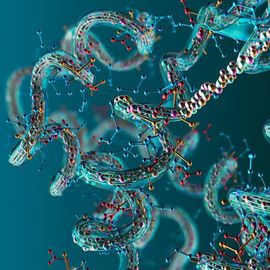Overview
- The T7-ORACLE system employs an engineered orthogonal T7 replication machinery in E. coli to hypermutate plasmid DNA at rates up to 100,000 times higher than normal while safeguarding the host genome.
- In proof-of-concept experiments, T7-ORACLE evolved TEM-1 β-lactamase variants with up to 5,000-fold increased antibiotic resistance in under a week, reproducing known clinical mutations and uncovering novel combinations.
- The platform integrates seamlessly with standard E. coli cultures and molecular biology workflows, avoiding the complex protocols and specialized equipment of earlier continuous evolution methods.
- Building on its antibiotic resistance benchmark, the research team has begun deploying T7-ORACLE to evolve human-derived enzymes for therapeutic targets in cancer, neurodegeneration and other diseases.
- The group is also advancing synthetic genomics by evolving polymerases that can replicate noncanonical nucleic acids with novel chemical backbones.
